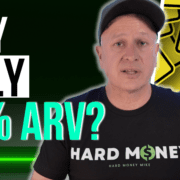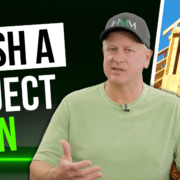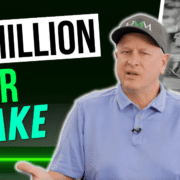What does it really look like to get the best real estate financing? Let’s go step-by-step.
Hard money is a stepping stone.
You start here. But you also need to know where you’re going.
One of the most common questions we get from beginner real estate investors is:
“Who can I borrow money from? How do I step out from just using hard money?”
We want to get you started with the money that makes sense for you now – but we also want to show you how to work up to Wall Street money, OPM, or even funding with your own cash.
We think of this journey as The Funding Ladder. Let’s go over what beginners should know about real estate financing – and how to get to each rung of the ladder.
The Importance of Real Estate Financing
Funding is at least half of what makes investing successful.
Yes, you have to buy good properties and get them at a good number. But the right funding is what truly seals a deal.
- Sometimes that means the funding is fast, so you can buy the good, available properties that need a quick close.
- Sometimes it’s funding that’s cheap. Cash flow is king, and lower-cost financing increases your cash flow.
- Sometimes it needs to be flexible. It needs to fit what you can apply for and get.
The Funding Ladder: 6 Levels to the Best Real Estate Financing
As you go from level to level, you accumulate more money because you save more money. Every time you step up, you’re going to put more money into your pocket, have more deals available, and at better pricing.
Here are the 6 rungs of this funding ladder.
#1: Partnerships
Typically, most people will start in either partnerships or hard money.
Partnerships are great because you don’t have to provide any of the funding. The partner will provide all the funding – and maybe even some expertise. The negative about a partnership is typically they’re going to take at least 50% of the profits and probably be a little too involved in the project.
But when you’re starting out and you need some experience and you don’t have the money, this is a great way to go too. You could do two or three deals with the partner, build up your experience and cash, then move to the next level.
#2: Hard Money
Secondly is local hard money.
This is asset-based lending. For real estate investors, this is what hard money used to be until they started changing the name to private money. Now, sometimes it gets a little confusing. Hard money, private money, fix and flip loans, rehab loans – they’re all referring to the same thing.
What you get from hard money is true investor-grade financing where they lend a higher loan-to-value, so you don’t have to put as much into the property.
They will be flexible. They will look at unique deals: land or small commercial or any type of unique property. Local hard money likely won’t care much about your credit score – so it’s a great option if your score is sub-700.
Additionally, hard money lenders care less about your experience. As long as your deal is sold, they might not require you to have completed any projects before.
Hard money is typically fast also. So if you need to close something in five days instead of 10 or 30, local hard money is the best real estate financing.
The cons of hard money are that:
- They’re smaller lenders with a smaller fund – so it’s possible for them to run out of money.
- They tend to be more expensive. It may cost you 1 – 1.5 more points than when you go with Wall Street private money.
#3: Wall Street Private Money
Next is what we call Wall Street Private Money. These are large firms.
The best part about these is they have seemingly unlimited funds.
They have similar interest rates as local hard money. Sometimes hard money is actually cheaper on the rates, but you’ll find private money 1-1.5 points cheaper.
The other benefit of private money is it could lend in multiple states and multiple regions. Typically, your partnerships, hard money, or even local banks will not lend out of their region.
They typically also could do longer terms. It’s not uncommon for them to do a 12 or 18 month. We don’t suggest that you take longer than 6-9 months on a fix and flip loan because the interest eats away at your profits every month. But the option is out there with private money.
Now, the negatives for the Wall Street private money:
- They have a box. If you don’t fit in their box, they won’t make their funding work for you. They find enough people who do fit in their box. So, if a property is unique, rural, etc, then they typically won’t bother.
- Typically, they’ll require 3-5 years of experience to get their best rates and terms.
- They’re also going to require that you have a decent credit score. The actual requirement changes, but right now it’s a minimum of 660, with a preference of 720+.
- Wall Street private money lenders won’t give you any escrow advances. When you close, they may fund 100% of your escrow for your fix-up, but they won’t give you any advance to start. So if you have like a $60,000 budget to fix up the property, they want you to put in that first $20,000 and then they will reimburse you.
#4: Local Banks
The next rung on the ladder of the best real estate financing is local banks.
There are a lot of small to mid-size local banks that love to lend to real estate investors. Rates are high currently from the Fed, but banks are still 1-2 points cheaper on the interest rate even compared to the Wall Street money points’ cost.
The negatives with local banks are:
- The speed. It can take two to four weeks minimum for them to fund a deal, which could cause you to miss out on deals.
- Local banks require certain credit scores, too, like private money does.
- They’ll also require money down and investing experience.
#5: Real OPM
Next is what we call real OPM (other people’s money). This is truly the best real estate financing. Regardless of your experience level, you can work toward getting OPM. Any rung on this ladder benefits from Other People’s Money.
Real OPM is money from real, normal people, not institutional lenders. It could be family, friends, or other people in your community.
These people want better returns for their money than they can get at a bank. Lending to you can be a way to get that secured return. out there looking for better returns.
You can also get a much better rate with an OPM lender than at a bank, credit union, private money, or hard money lender. There’s nothing out there that’s faster, cheaper, or easier to get.
Once you build an OPM relationship, your lender will want to give you money as much as you want to get it. It’s simple to call them up and let them know you found a good deal. There’s no underwriting, no credit checks, and oftentimes they can fund the full amount you need.
It’s important to attract and keep your OPM lenders (if you want more help setting this up, reach out to us – this is one of our specialties!).
#6: Lines of Credit
As you accumulate properties, you’ll want to move on to lines of credit as a funding source. This is where banks (whose loans are slow) can offer you a product that’s quicker than the rest.
A bank line of credit is like a big HELOC, except instead of being on one property, it spans 5 or 6. This line of credit is immediate funding – which is great for fast auction closes.
When you have a large line of credit at your disposal, all the wholesalers and local sellers will go to you first because they know you’ll give them a fast close.
How Do You Get the Best Real Estate Financing?
We want people who come into this business to understand that hard money is a stepping stone. They’re going from here, but they also need to know where they should be headed.
We want to educate people, make them comfortable, confident real estate investors, and help where we can along the way.
Have questions about any point in this process? Want to talk with someone about how to go from where you are now up to the next step? Reach out to us at Info@HardMoneyMike.com.
Happy Investing.










